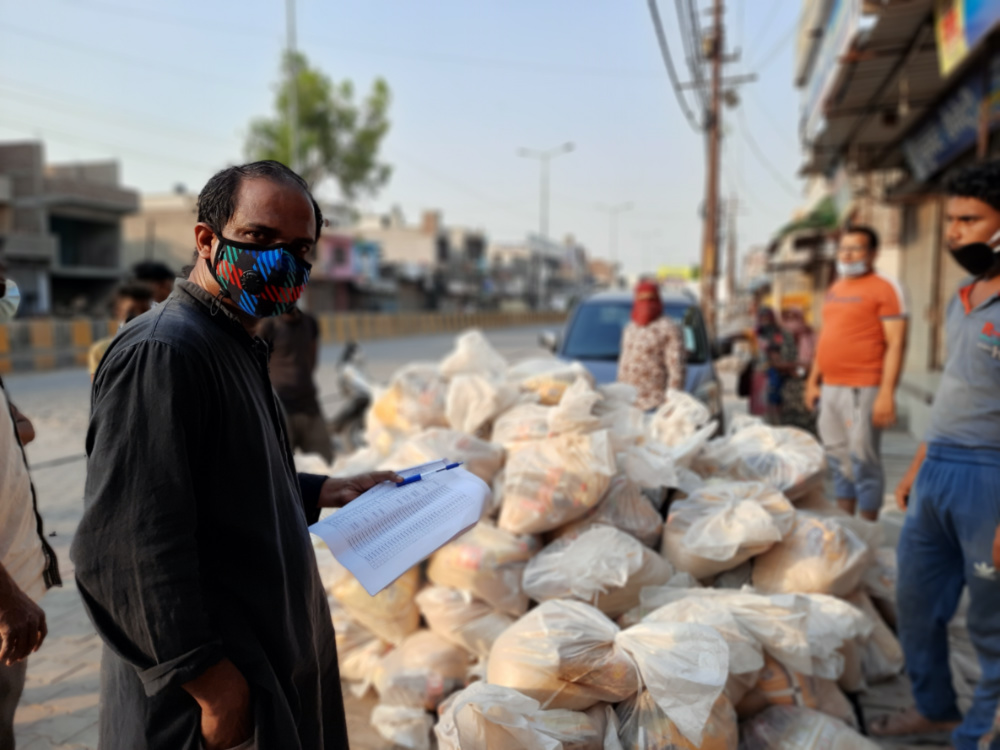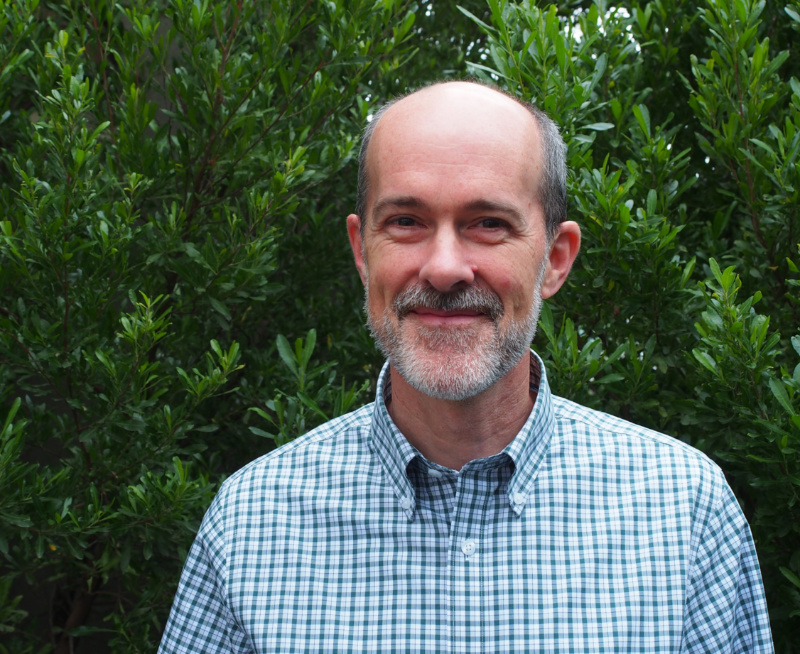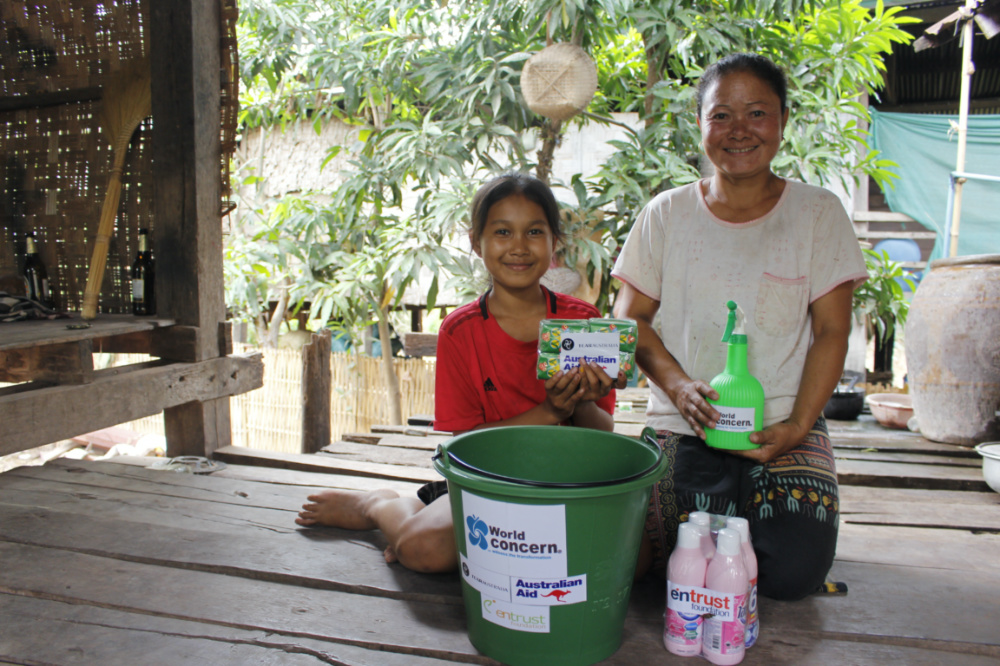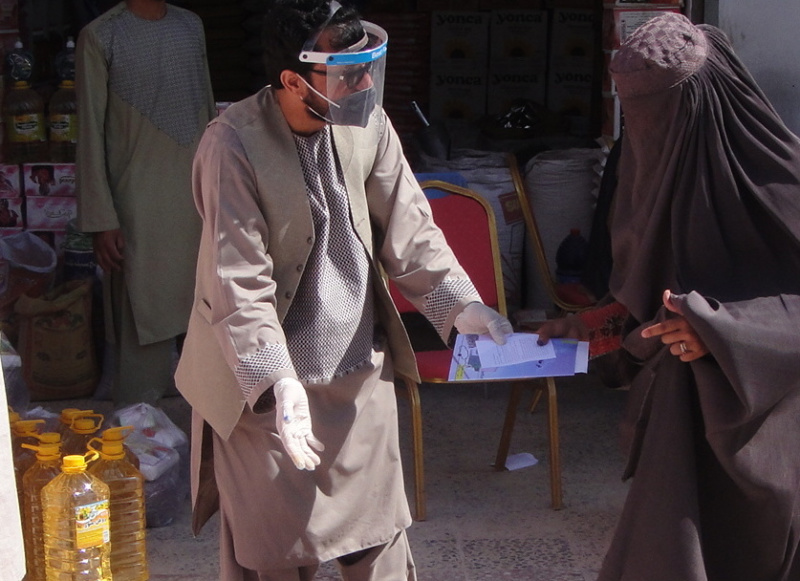
DAVID ADAMS speaks with Tearfund Australia CEO Matthew Maury about the impact of the coronavirus pandemic on the world’s most vulnerable, the need for global cooperation in addressing it and the organisation’s recent name change…
The battle against global poverty and inequality has suffered some massive blows as a result of the COVID-19 pandemic with tens of millions more people likely to find themselves living in extreme poverty and the UN’s flagship Sustainable Development Goals – 17 goals relating to everything from global poverty to gender equity and clean water access which were due to be achieved on a range of dates leading up to 2030 – set back years.
That’s the bleak picture Matthew Maury, CEO of Christian aid and development agency, Tearfund Australia, paints when asked about the impacts of the crisis currently being seen around the world.

Tearfund’s partner EFICOR has overseen the distribution of relief packages to thousands of families in need around Delhi. PICTURE: Courtesy of Tearfund Australia.
“All of our modelling and projections in terms of what we’re seeing with the economic impacts of this crisis are that global poverty will increase for the first time in 30 years…Somewhere around 130 million people are probably going to go into extreme poverty because of the impacts of COVID-19,” he says, adding that work towards the SDGs has probably been set back at least seven years.

Matthew Maury, CEO of Tearfund Australia. PICTURE: Courtesy of Tearfund Australia.
“The needs are huge….We’ve kind of run out of superlatives and in some ways superlatives have become meaningless because the scale of the impact is just so significant.”
– Tearfund Australia CEO Matthew Maury, speaking about the impact of the coronavirus.
And Maury is quick to point out that such outcomes are based on governments and agencies around the world doing what they can to help communities respond.
“The needs are huge…” he says. “We’ve kind of run out of superlatives and in some ways superlatives have become meaningless because the scale of the impact is just so significant.”
Maury says the response, therefore, requires an unprecedented international effort.
“I think, at least in our memory, we’ve never seen anything like this in the work that we do and it does require us to be thinking globally and across borders and regionally. The ways that the world is interconnected, I suppose, adds to the complexity.”
He points to the impact on tourism in countries like Nepal, for example, as well as the impacts on the millions of people who work in foreign nations and send home remittances.
“So the impact is a global impact and what we’re seeing has a bigger impact on people who are most vulnerable because the nations we work in don’t have the social safety nets; they don’t have the luxury of a government running a hundred billion dollar deficit like [Australia’s] government can do so they need to find other ways to address [the crisis].”

In Laos, Tearfund’s partner World Concern launched a response to equip over 1,400 families with hygiene and sanitation supplies, improving their protection against the spread of COVID-19 as well as other potential outbreaks of seasonal and water-borne diseases. PICTURE: Courtesy of Tearfund Australia.
Tearfund recently changed its name from TEAR Australia back to the original moniker it had when it was established in 1971 by the Australian Evangelical Alliance as a part of a global movement of humanitarian agencies working under the auspices of the World Evangelical Alliance and known as The Evangelical Alliance Relief Fund (Tearfund).
The Australian arm changed its name to TEAR Australia when it became independent of the AEA in 1998 but Maury – who has been the organisation’s CEO for the past 11 years and who has more than 30 years experience working in the aid and development sector in Africa, Asia, Latin America and the Pacific – says the decision to change the back came as a result of the growing body of collaborative work the organisation was now carrying out with partner Tearfund agencies around the world.
AUSTRALIAN FEDERAL BUDGET RESPONSE
Like many Australian-based aid and development agencies, Tearfund Australia welcomed the Australian Government’s recent announcement in the Federal Budget that it was committing an additional $A305 million to supporting the COVID-19 response in the Pacific region and Timor-Leste over the next two years.
“So we were really thankful for that and celebrated that,” says CEO Matthew Maury, noting that calling for additional support for Australia’s neighbouring nations was one of the central aims of the #EndCOVIDForAll campaign which Tearfund had supported.
But he adds that the budget overall came out with another decrease in foreign aid expenditure and still sees the foreign aid budget sitting, proportionally speaking, at the lowest level it’s ever been.
“Something around a half a cent [per dollar spent] out of the entire budget is allocated to international aid and development work,” he says. “So we’re thank for the response but are still calling on our government to do more.”
Maury says Tearfund often sees a disconnect between people’s understanding of what the government is doing in terms of its foreign aid budget and what it’s actually doing and says that research has shown that when asked directly about foreign aid, most Australians believe somewhere between five and 10 per cent of the budget should be going to foreign aid.
“When they’re told, ‘We’ll actually…we’re giving less than one per cent or half of one per cent, they’re quite surprised. So there is, I think, a narrative disconnect…and part of what our job is, is to be better tell that story.”
“In some ways COVID-19, I suppose, became the best case study as to why we wanted to change our name back and that was the recognition that when these big global challenges confront us – and COVID-19 being the most immediate example, we’re not solving these problems just within our own national boundaries…” he notes.
“We need to really be looking globally at the global solutions that are needed for global challenges. And [there’s] this sense that we are part of a bigger Body of Christ – we’re not just an Australian organisation working in Australia but we’re part of the bigger family of agencies and, as I said, the bigger Body of Christ responding. And COVID-19 is an example but our commitment is to try and tackle big poverty and justice issues around the world and the fact of the matter is all of them require us to be thinking globally about solutions. So whether it’s our work in relation to human trafficking or wider issues of poverty or inequality or climate change – all of them require us to think globally.”
Maury, who is also vice president of the ACFID board (the peak body of Australia’s aid and development sector), vice chair of the Micah Global Board, and a member of the Campaign for Australian Aid Executive Committee, says working with other Tearfund agencies (Tearfund, which works with a range of partner organisations in developing nations, has offices in 11 donor countries including those in the UK, numerous European nations, the US, Canada and New Zealand) also has the benefit of improving efficiency.
“There’s just a practical reality that as we’re working closely with this wider family of agencies, we can avoid duplication. In practical terms, instead of each agency having to do evaluations and budgets and plans for a project that we may be collaborating [on] in, say, India or Afghanistan, we can be more organised and try to reduce some of those overhead costs and thus when people support us – when churches and individuals give to us – the money goes farther.”
That is all that much more important when responding to a crisis the size of the coronavirus pandemic.

In Afghanistan, many families have struggled to access necessary supplies as a result of local restrictions. Tearfund’s partner Serve are reaching more than 2,400 local families with vital food and sanitation supplies, as well as up-to-date information to help prevent the spread of COVID-19. PICTUR: Courtesy of Tearfund Australia
Yet, while most of the focus during the coronavirus pandemic has rightly been on its negative impacts, one of the positives to come out of it may be that inequalities and injustices around the world have been exposed like never before.
Maury says he’s hopeful in that regard.
“I was talking to one of our partners in Pakistan and their reflection was that they believe that as they were having contact with supporters in other countries…they felt like people’s eyes were being opened to the fact that this world is more connected than we think,” he says. “It’s difficult to be thinking about what are the good things to come out of this virus but hopefully one of the lessons we learned…is this bigger sense of global issues.”
Maury says while recent years have seen politics around the globe driven largely by rising nationalism and a turning inward – think of Brexit or US President Donald Trump’s border walls or Australia’s treatment of refugees, the coronavirus pandemic had revealed the opposite to be true; that, in fact, we are “part of this globally connected world”.
HOW CAN YOU HELP?
While supporting Tearfund Australia’s work through financial donations is one way to support the organisation’s work, CEO Matthew Maury says the organisation also encourages people to “use their political voice”.
He says the success of the #EndCOVIDForAll campaign in calling on the government to give more aid to Australia’s neighbouring nations to help their coronavirus pandemic response is an “great illustration that, actually, government does listen, that our politicians do hear and that they do respond when people raise their voice”.
Maury also points to people’s advocacy around the issue of plastic pollution, particularly when it comes to encouraging big companies to take action, as another area where Tearfund supporters have been involved in recent years.
Prayer is also, obviously, a key way, people can support Tearfund’s work.
“The number one request I get from our partners when we talk to them about how we can support them, is their request – from some of the difficult places that the church is operating in around the world – to pray, to lift them up in prayer.”
“I think as Christians, it’s an opportunity for us to be much more mission-minded as well and to be thinking, ‘Well, actually, what does it mean to love our neighbour?’ It’s not the just the person who’s physically next to us but what does it mean to be part of this interconnected world and to love our global neighbours in the ways that we respond to these bigger challenges.”
Maury says he’s been heartened by the response of the organisation’s supporters in this regard with people showing greater generosity “as they see the needs of those around them”.
“So I think it’s an opportunity for some of the best of who we are as followers of Jesus, but also just as interconnected people around the world,” he says. “It brings out the best in being willing to reach out in new ways, to give, to be generous, to be open-handed.”
Having said that, he doesn’t play down the challenges ahead for his organisation as Australia, like other nations, faces financial difficulties in coming months and years,
“There will certainly be challenges for all agencies who raise money from the public as they think about what will be the longer term impact,” he says. “But, at least in the short-term – and because of the huge humanitarian needs, we’ve actually been surprised and thankful by how generous people have been.”
Looking ahead, Maury sees that one of the biggest issues the organisation will be grappling with in the months ahead is what he calls “vaccine justice”.
“When a vaccine is announced, who will actually get that vaccine and how will it be distributed? Will it just go to the wealthy nations who have bought up all the rights or will it be more equitably and fairly distributed globally? And that’s going to be, I think, a big question and that’s going to again challenge nations to ask this question of what does it mean to think globally – as opposed to just nationally – about these issues.”





